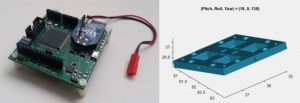About
LASARRUS LLC., is family run business that is focused on providing a state-of-the-art clinic for rehabilitating patients suffering from post-stroke trauma or joint injuries of the upper extremities, while performing research and development on new and innovative robotic devices for robotic-assisted therapy.
About this Project:
We at LASARRUS Clinic and Research Center are looking to utilize new technologies help patients suffering from post-stroke trauma or joint injuries. To see our vision come to reality we have developed a product, we call the Mango.
The Mango is a compact field-programmable-gate-array (FPGA) platform that can be used for a wide range of projects, such as signal processing, mobile computing and robotics.
The Mango is Versatile
FPGA Mango board comes with a soft-core Nios II processor running on an Altera Cyclone IV FPGA. The board comes with 16MB of SDRAM, 16Mb EPCS flash memory, and a micro SD card slot. The FPGA Mango board also comes equipped with 9 degrees of freedom IMU (with temperature sensor) and four PWM motor controllers, which makes it a perfect solution for many applications, including robotic applications.
Mango is Developer Friendly
All you need is a micro-USB cable and an external USB blaster cable to begin developing with the Mango.
Mango is Easy to Use
For those new to the world of FPGAs, fear not!!! The Mango comes equipped with a hardware file that contains all the necessary interfaces and utilities to get started. The user only needs to know C/C++ to access these interfaces and begin using the open-source library. No licenses are required to get started with the Mango. All you need is Quartus II Web edition (or Quartus Prime Lite) and a free version of Nios II Eclipse available through Altera.
Mango Just Works !
The video demonstrates the sensor fusion capabilities of the Mango. It shows the pitch and roll computed in real-time from the aggregated sensor measurements.
Mango is Open
For interfacing with the external world, the FPGA Mango board comes with Arduino compatible headers and a ZigBEE/BluetoothBEE interface for low-power wireless access. Furthermore, all code running on the FPGA Mango boards are completely open source.
Read more: Mango: A Compact Size FPGA Research Platform

